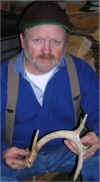| 1-3-05
Strange are the ways of nature. But as strange as the products of Mother
Nature can be, these departures from the normal are one of the most interesting
facets of the big outdoor picture.
Take, for example, an experience I had last week while sitting in this
very chair while hacking away at my antiquated computer (I hope it will
carry me through this column).
My computer is perched on a wing of my desk in front of double glass
doors that look out over my front-yard jungle. Here I see many interesting
facets of the big outdoor picture (like my resident sharp-shinned hawk,
birds and critters of many species, and who knows what else). Every day
brings something new, and that is one of the strong draws of nature.
Just before Christmas, when snow was piled high everywhere, I saw the
most exotically beautiful robin I have ever seen. He/she was sitting in
a redbud tree no more than 15 feet away.
The barrel chest of the bird, characteristic of the robin, was a pale
pink, which would have been enough to set this bird apart from other robins
with their deep orange (not red) breast. But if that was not enough to
place this bird on a limb by itself, there was a snow-white band about
half an inch wide running from just below the neck as far back as I could
see.
I marveled at the beauty of the bird and tried to get a picture of it,
but a bright sun coming through the trees thwarted my photographic efforts.
I could see the outline of the bird in the picture, but could not see any
detail.
The bird must have sat facing me for five minutes while I tried to record,
mentally, its characteristic movements and general demeanor. Everything
pointed to the fact that this strange critter was, indeed, a robin.
Then, as if to compensate for my inability to get a picture, the bird
turned on the limb and raised its tail to display a beautiful, fan-shaped
area of white fuzzy down under the tail.
From the back view I could not see where the fan shaped area joined
the white strip that bisected the beautiful pink breast, but it certainly
must have.
So what is the solution to Mother Nature’s riddle? Who knows? Albinism
almost certainly is involved. But if I never know any more than that, the
picture of that bird will be with me forever.
SHED HUNTING
Sam Dickson, or rural Wayne County, launched the shed-hunting season
last week by finding one side of the antlers of what probably was an 8-point
buck. Dickson found his prize in an apple orchard on his farm, the deer’s
down payment for the fine apples scarfed in the orchard.
When white-tailed deer, like other members of the cervid (deer) family,
drop their antlers, a small, but dedicated army of Hoosier outdoors folks,
start looking for the discarded hardware.
Fred Lucas, a taxidermist with an office near Morgantown, tells one
of the most interesting shed-hunting stories I have ever heard. Fred said
one of his customers showed up at his shop one day soon after the deer
season had ended with a set of gigantic antlers, not joined (sheds never
are joined).
As the story goes, this Bloomington hunter had tried throughout the
season to bag a deer that sported a storybook rack. But he never got a
shot. While driving a back road after the season had ended, the hunter
saw parts of both sides of a huge deer rack sticking up above weeds, and
believed that he would, at last, get a good look at the monster buck.
But as he approached the spot, the deer did not bolt and run. The hunter
found where the deer had bedded down in the weeds . . . and had shed both
sides of his antlers.
Lucas mounted the antlers together as well as he could, and he believed
it would have been close to a state record rack. But to be considered for
records, the two sides of the antlers must be attached to the skull when
the rack is scored.
Click
on thumbnail image for enlarged view.

|
Sam
Dickson found this rack dropped by a buck in his apple orchard. |
|

